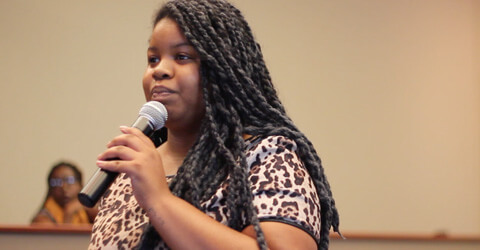Malika Whitley is an art curator, activist, and the founder of ChopArt, a multidisciplinary arts organization for homeless middle and high schoolers. Her inspiration stems from her own experience of homelessness that she encountered as a child and a teenager. During high school, she found a safe escape through the arts as a tool to combat the hardships that come with youth homelessness.
Whitley grew up in Atlanta with two loving parents and siblings. She recalled fondly, “I had a wonderful, enriching childhood. My sister is actually my best friend.” However, growing up, things changed for the worst, and her family struggled with homelessness.
She recalled, “I remember having trash bags and sleeping on couches. And I remember a lot of dark nights. But I also remember my family really taking a lot of care to make sure that we were well-nurtured and loved during that time.”
During her teenage years, her mother was diagnosed with psychosis, and her mania escalated. Her mother would either be on medication, which would pull her away from other aspects of her personality or when she wasn’t following any treatment, she would have a nervous breakdown. Whitley said, “And so it was kind of like a lose-lose. Either I don’t have my mom in this way, or I don’t have my mom in that way. During my teenage years, it hit a fever pitch because every one of us had moved out of the house. And I was the last standing scapegoat. And it just became unbearable and just a little too dangerous for me to be there. And so I had to flee.”
During that time, she joined Atlanta’s 3,300 homeless youth, a number that increases every day. Like other Washington students and thousands of young people in the populous state of Atlanta, Whitley started living on the street, in conference rooms, abandoned buildings, friend’s houses and public offices in the city. Whitley even found herself attending weekend visits provided by Oglethorpe University to prospective students to have a place to stay.
Whitley said, “I realize that most people thought of homelessness as some kind of lazy, drug-induced squalor and inconvenience. But that didn’t represent my book bag full of clothes and school books or my A-plus grade point average.”
Whitley coped with this challenging situation in an unconventional way. She found herself immersed in the arts as an outlet to express her emotions and deal with the trauma she had experienced. She said, “it started off with poetry. I would just write in my journal. And then it expanded into singing, and I would just find different places where I could sing. And I ended up landing on this church. And they had really good acoustics in the basement. And so I would just go really early and sing in that church. And I think it allowed me to steal a few hours each day where I just felt normal.”
However, she did have her fair share of bad days. She said, “Unoccupied time was torture. If you don’t have enough money to eat, then you’re sitting there thinking about food, or a shower, or home. And if you don’t have a way to occupy your mind, then you can really lose yourself.” To combat this predicament, when she was not working part-time at Pizza Hut, she found an escape by spending time at the library downtown, writing poetry or listening to a CD.
In 2007, Whitley graduated from high school and found her way back to Oglethorpe University with a scholarship, which paid her way to a degree in international communications, cultural relations, and social economics. In 2010, she interned at a music studio in Cape Town, South Africa and started a program that connected young street musicians to industry professionals that helped discover young talent. During her post-graduate fellowship in India, she expanded the project to cities like Hyderabad.
In 2012, Whitley returned to the United States with a mission to help kids experiencing homelessness. She designed a curriculum to give kids an outlet for their artistic expression, like singing in the church basement had helped her deal with her negative experiences. With in-kind donations of art supplies and a year-plus partnership with the City of Refuge, a women and children’s shelter on the Westside, she officially launched ChopArt. The organization used arts as a tool for trauma recovery by taking what they know about restoring dignity and community building and applying that to the creative process. ChopArt is headquartered in Atlanta, with additional programs in Hyderabad, India, and Accra, Ghana.
Whitley explained, “Teens can take refuge in the transformative elements of the arts and depend on the safe space ChopArt provides for them to do that. An often invisible population uses the arts to step into their light. But that journey out of invisibility is not an easy one.” She continued, “many of our teens have come into the program, and, for the first time in their lives, they’re able to express their trauma. And seeing the power of telling a teenager who is feeling absolutely alone that you see them is life-changing.”
Tenth-grader Elijah Evans, who once slept on the streets with his mother and brother, has attended ChopArt camps for two summers. Now, he plans to pursue opportunities in music and dance. “The program taught me that life is more what you make of it,” he said.
Due to this brilliant initiative, The City of Atlanta’s Partners for Home and DeKalb County have recognized this emerging crisis and expanded services for young people struggling with homelessness. However, public agencies focus first on fundamental challenges like food and shelter. Programs like ChopArt can help homeless youth look forward to life by tapping into their ambition and creativity, says Eric Wright, the professor who led the GSU study. “As Whitley probably experienced, finding and nurturing their talents can help them not only find a way out of homelessness but also create a life as an adult that’s prosperous and meaningful and fulfilling,” he added.
The initiative has helped more than 30,000 teenagers to date and continues its mission by empowering the youth. The nonprofit has expanded over the globe to cities such as New Orleans, Miami, Memphis, Jackson, Birmingham, and Charlott. More than a decade ago, in the basement of the church in East Point, such plans would’ve seemed impossible. “Right now, life is kind of a miracle,” Whitley concluded.








